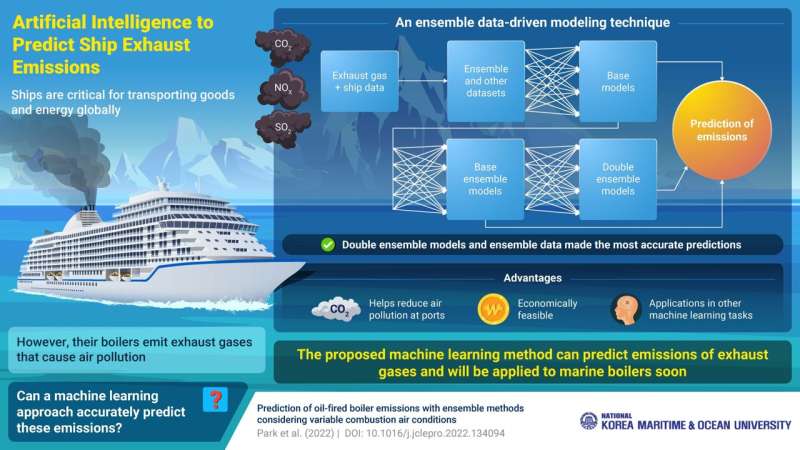Leveraging machine learning to help predict ship exhaust gas emissions

Ships are a major means of commercial transport, contributing to 80% of global goods and energy trade. However, they emit exhaust gases—from the engines when they are sailing, and from the engines and boiler when they dock in ports. These emissions negatively affect not only human health, but also the environment.
Therefore, the International Maritime Organization has imposed regulations on the type of fuel used in ships. While efforts are being made to reduce the level of emissions from ships, a completely eco-friendly fuel is yet to be developed. In the meantime, assessing and predicting the level of exhaust emissions from ships is of paramount importance.
Given this background, a group of researchers from the National Korea Maritime and Ocean University (NKMOU) led by Dr. Won-Ju Lee, an Associate Professor in the institute’s Division of Marine System Engineering, have measured the emissions of a continuously operating oil-fired boiler in a training ship under different air-to-fuel ratios. “The exhaust data for CO2, NOx, and SO2 gases were collected for 18 cases and used for predicting emissions through data-driven modeling,” explains Dr. Lee.
Their work was published in the Journal of Cleaner Production on 15 November 2022.
The researchers employed unsupervised learning to compress the original data for generating three new datasets. They combined them to create an ensemble dataset. The performance of these five datasets was evaluated—in terms of CO2, NOx, and SO2 predictions—using four base models. The Support Vector Machine-based models with the original and ensemble datasets produced the best results.
Then, the researchers merged the base models to develop four base ensemble models. These models, in turn, were used to build double ensemble models. As expected, the double ensemble models made the most accurate emission predictions for all three gases.
Lastly, the researchers applied the developed models to a new dataset, verifying the results and establishing the models’ superiority and generalizability.
How can this work help the shipping industry reduce its carbon footprint, though? Dr. Lee discusses the future implications of their work. “The results of this study can be used to predict emissions of exhaust gases and will be applied to marine boilers soon. It shall enable the marine engineers to take action to reduce emissions, curbing air pollution in port areas. Since installing expensive equipment such as gas analyzers in boilers is not economically feasible for shipping companies, the proposed technology will prove indispensable. Furthermore, the ensemble data generation and double ensemble model techniques can enhance the performance of various other machine learning applications.”
Min-Ho Park et al, Prediction of oil-fired boiler emissions with ensemble methods considering variable combustion air conditions, Journal of Cleaner Production (2022). DOI: 10.1016/j.jclepro.2022.134094
Provided by
National Korea Maritime and Ocean University
Citation:
Leveraging machine learning to help predict ship exhaust gas emissions (2023, January 4)
retrieved 4 January 2023
from https://techxplore.com/news/2023-01-leveraging-machine-ship-exhaust-gas.html
This document is subject to copyright. Apart from any fair dealing for the purpose of private study or research, no
part may be reproduced without the written permission. The content is provided for information purposes only.
For all the latest Technology News Click Here
For the latest news and updates, follow us on Google News.
